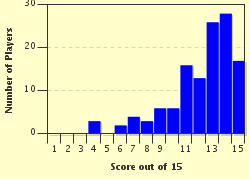Quiz Answer Key and Fun Facts
1. "The Bridge on the River Kwai" is set in a prison camp in Siam (now Thailand) during which 20th century war?
2. In an Oscar-winning role, who played British Lt. Colonel Nicholson?
3. Nicholson clashed with the camp commandant, Colonel Saito, over what issue?
4. How was Lt. Colonel Nicholson punished for his stance against Saito?
5. The prisoners were put to work building a bridge across the River Kwai. The bridge was part of a railway line that Japan was constructing to support its invasion of what country?
6. The prisoners did as little work as they could get away with and attempted to sabotage the bridge construction, causing Saito great distress. What was the consequence if the project failed to complete on time?
7. Nicholson offered to have his men design and build a better bridge, and work even faster than the Japanese officers required. Why?
8. Meanwhile, United States Navy Commander Shears managed to escape the camp and, with the help of some Thai villagers, found his way to safety at a military hospital in Ceylon. Who played Commander Shears?
9. Shears is offered the opportunity to join a probable suicide mission: travel through the jungle to blow up the bridge. Naturally, he's not keen on the idea. What do the British Special Forces know about him that is used as blackmail?
10. The commando force landed in Siam to begin their trek through the jungle to the bridge site. However, one of their members died almost immediately. How?
11. The commandos set up their explosives on the bridge at night, planning to blow it up the next day just as a Japanese military train crossed over. However, in the morning they discovered something that put their whole mission at risk. What was it?
12. The commandos' plan hit a snag, to say the least, and lives were lost in the ensuing chaos. Who survived?
13. Medical officer Major Clipton, played by James Donald, uttered the film's famous last words. What were they?
14. "The Bridge on the River Kwai" is strongly associated with a popular military tune whistled by the prisoners as they marched into the camp in the opening scene. What is its formal title?
15. "The Bridge on the River Kwai" was based on a book whose author also wrote the science fiction story "The Planet of the Apes". What was his name?
Source: Author
lorance79
This quiz was reviewed by FunTrivia editor
skunkee before going online.
Any errors found in FunTrivia content are routinely corrected through our feedback system.


